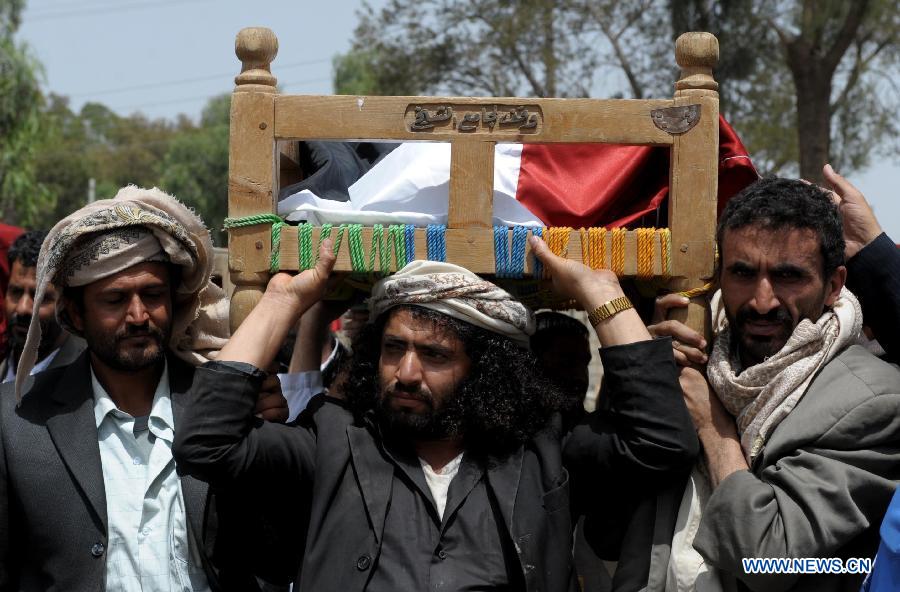Yemen Feature: Covering Up the Civilian Deaths from a US Drone Attack (Raghavan)
 Wednesday, December 26, 2012 at 7:02 |
Wednesday, December 26, 2012 at 7:02 |  Scott Lucas in
Scott Lucas in  EA Middle East and Turkey,
EA Middle East and Turkey,  Middle East and Iran
Middle East and Iran 
Funeral in Dhamar, Yemen, after a US drone strike, September 2012 (Photo: Mohamed Mohamed/Xinhua)
Sudarsan Raghavan writes for The Washington Post:
A rickety Toyota truck packed with 14 people rumbled down a desert road from the town of Radda, which al-Qaeda militants once controlled. Suddenly a missile hurtled from the sky and flipped the vehicle over.
Chaos. Flames. Corpses. Then, a second missile struck.
Within seconds, 11 of the passengers were dead, including a woman and her 7-year-old daughter. A 12-year-old boy also perished that day, and another man later died from his wounds.
The Yemeni government initially said that those killed were al-Qaeda militants and that its Soviet-era jets had carried out the Sept. 2 attack. But tribal leaders and Yemeni officials would later say that it was an American assault and that all the victims were civilians who lived in a village near Radda, in central Yemen. U.S. officials last week acknowledged for the first time that it was an American strike.
“Their bodies were burning,” recalled Sultan Ahmed Mohammed, 27, who was riding on the hood of the truck and flew headfirst into a sandy expanse. “How could this happen? None of us were al-Qaeda.”
More than three months later, the incident offers a window into the Yemeni government’s efforts to conceal Washington’s mistakes and the unintended consequences of civilian deaths in American air assaults. In this case, the deaths have bolstered the popularity of al-Qaeda in the Arabian Peninsula, the terrorist network’s Yemen affiliate, which has tried to stage attacks on U.S. soil several times.
Furious tribesmen tried to take the bodies to the gates of the presidential residence, forcing the government into the rare position of withdrawing its assertion that militants had been killed. The apparent target, Yemeni officials and tribal leaders said, was a senior regional al-Qaeda leader, Abdelrauf al-
Dahab, who was thought to be in a car traveling on the same road.
U.S. airstrikes have killed numerous civilians in Afghanistan, Pakistan and other parts of the world, and those governments have spoken against the attacks. But in Yemen, the weak government has often tried to hide civilian casualties from the public, fearing repercussions in a nation where hostility toward U.S. policies is widespread. It continues to insist in local media reports that its own aging jets attacked the truck.
Meanwhile, the Obama administration has kept silent publicly, neither confirming nor denying any involvement, a standard practice with most U.S. airstrikes in its clandestine counterterrorism fight in this strategic Middle Eastern country.
In response to questions, U.S. officials in Washington, who spoke on the condition of anonymity because of the sensitivity of the matter, said it was a Defense Department aircraft, either a drone or a fixed-wing warplane, that fired on the truck. The Pentagon declined to comment on the incident, as did senior U.S. officials in Yemen and senior counterterrorism officials in Washington.
Since the attack, militants in the tribal areas surrounding Radda have gained more recruits and supporters in their war against the Yemeni government and its key backer, the United States. The two survivors and relatives of six victims, interviewed separately and speaking to a Western journalist about the incident for the first time, expressed willingness to support or even fight alongside AQAP, as the al-Qaeda group is known.
“Our entire village is angry at the government and the Americans,” Mohammed said. “If the Americans are responsible, I would have no choice but to sympathize with al-Qaeda because al-Qaeda is fighting America.”
Public outrage is also growing as calls for accountability, transparency and compensation go unanswered amid allegations by human rights activists and lawmakers that the government is trying to cover up the attack to protect its relationship with Washington. Even senior Yemeni officials said they fear that the backlash could undermine their authority.
“If we are ignored and neglected, I would try to take my revenge. I would even hijack an army pickup, drive it back to my village and hold the soldiers in it hostages,” said Nasser Mabkhoot Mohammed al-Sabooly, the truck’s driver, 45, who suffered burns and bruises. “I would fight along al-Qaeda’s side against whoever was behind this attack.”

Reader Comments